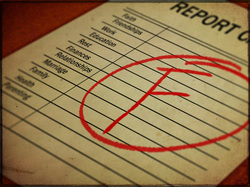
As I desperately attempt to infuse a sense of urgency into a struggling student's Language comment while still maintaining a hopeful and optimistic tone, I can't help but reflect on what an incredible waste of time our current reporting system in Ontario seems to be: I am tired and cranky from burning the midnight oil all week, and I haven't planned or executed a stellar lesson in days. My family is fed up with me, and my students can sense the stress of the looming deadline. (And don't tell me to start earlier with my summative assessment... the marks on the report cards are already old news by the time they are sent home each term, and that's with me waiting until the last minute to get as much recent data as possible in some subjects.)
The tension and exhaustion is thick in the hallways as teachers scramble to get the kids out the door at recesses and lunch time so they can rush to their computers and input one or two more carefully worded Science comments before the bell rings again...
And what for?!
The truth is that in many communities, the vast majority of families have neither the time nor the wherewithal to decipher my cryptic messages accompanying a "C" grade. Why, they must wonder, is my child getting a C, when the comment indicates that they are beginning to do such and such, or that -- with teacher support -- they read a variety of texts? That's good, no? So what's with the C?!
For families from cultures with school schema that -- for many -- includes teachers who are much more frank about areas students are struggling in, it can be a real challenge to read between the lines and try to figure out what exactly the gaps in learning are.
The best way to communicate this information, in my opinion, is through regular contact with families throughout the year. A plan that includes a combination of phone calls, notes in the agenda, monthly newsletters or curriculum updates and in-person meetings as required keeps all parties on the same page, in terms of supporting their children, far more effectively than a 4-page legal document riddled with artfully manipulated sentences.
The latest education research suggests that report cards don’t do much good anyway, said Jim Field, an associate professor with a specialization in assessment at the University of Calgary’s faculty of education. (more here)
I'm happy to see that the Calgary Board is moving into a more enlightened realm of reporting, and I harbour some hope that educational leaders and lawmakers here in Ontario might soon follow suit!!!


 RSS Feed
RSS Feed